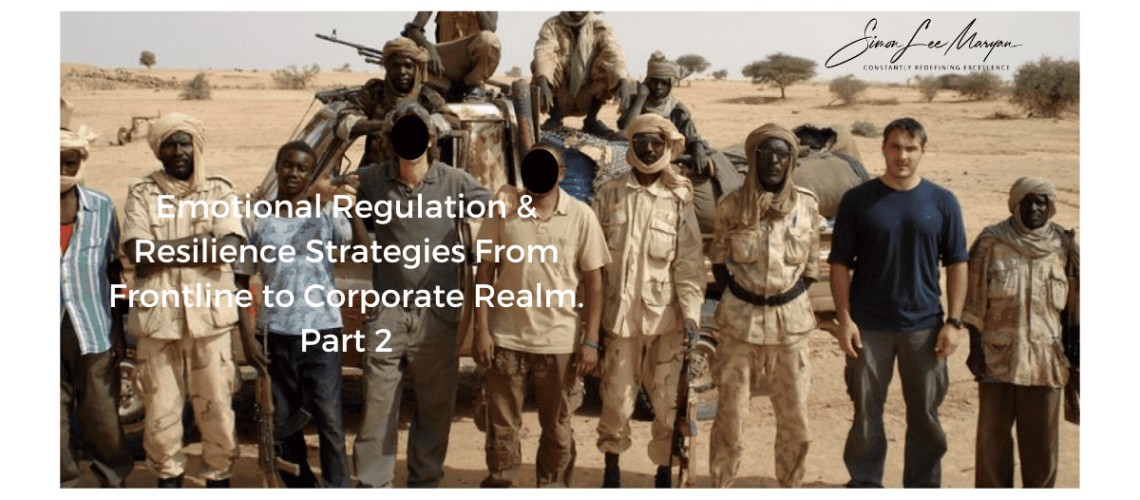Integrating Military Precision into Daily Life: Applying Emotional Regulation Techniques
The disciplined emotional regulation techniques honed in military and intelligence operations are not just reserved for high-stakes situations on the battlefield or during covert assignments. These powerful strategies can be seamlessly integrated into everyday life, offering profound benefits in managing stress, enhancing decision-making, and improving overall emotional well-being. Here’s how you can adopt these methods to transform your daily routines:

Practical Applications of Military Emotional Regulation Techniques
- Mindfulness in Daily Routines:
- Context and Application: Mindfulness, a cornerstone of mental training in the military, involves being fully present and engaged in the moment without judgment. By practicing mindfulness during routine activities—such as eating, walking, or even during your morning commute—you can cultivate a heightened sense of awareness. This practice helps you observe your emotions and thoughts without being overwhelmed by them, leading to improved emotional stability and enhanced presence of mind.
- Benefits: Regular mindfulness practice can reduce stress, increase focus, and improve relational well-being by making you more attuned to the needs of others around you.
- Stress Inoculation:
- Context and Application: Just as soldiers are gradually exposed to stressors in training and throughout their careers to build their resilience, you can apply a similar strategy in your personal and professional life. By intentionally taking on progressively challenging tasks—whether learning a new skill, managing a complex project, or even engaging in difficult conversations—you incrementally build your capacity to handle stress. This approach, known as stress inoculation, prepares you to deal with high-pressure situations more effectively when they arise.
- Benefits: This technique not only enhances your resilience but also boosts your confidence in handling future challenges, mirroring the preparedness seen in military training.
- Focused Breathing:
- Context and Application: Controlled breathing is a quick and effective method used by military personnel to regain calm and focus under pressure. Before entering a stressful meeting or during a critical moment, take a few minutes to practice deep, focused breathing. This exercise involves slow, deliberate breaths that help stabilise your heart rate and bring your emotions under control.
- Benefits: Regular practice of focused breathing can improve your physiological response to stress, increasing mental clarity and emotional regulation when you need it most.
- Reflective Practice:
- Context and Application: After-action reviews are critical in military operations, where every decision and action is analysed for lessons learned. You can apply this reflective practice to your own experiences by regularly reviewing your emotional responses to various daily events. Understanding your triggers and reactions helps you learn from them and develop better coping strategies.
- Benefits: This practice not only fosters personal growth and self-awareness but also enhances emotional intelligence, crucial for both personal relationships and professional leadership.
By incorporating these military-inspired techniques into your daily life, you can achieve a level of emotional regulation that not only mimics the poise and discipline of a trained soldier but also significantly enhances your ability to navigate the complexities of modern life. Whether it’s through mindful eating, tackling a challenging task at work, mastering your breath during a stressful moment, or reflecting on your day, these strategies offer a practical roadmap to a more balanced and resilient existence.
Building Resilience: Lessons from the Royal Marines and Intelligence Services
Resilience isn’t merely about recovering quickly from difficulties; it’s about thriving in the face of adversity and emerging stronger. This principle is a cornerstone in the high-stakes environments of the Royal Marines and intelligence operations, where resilience transcends being a desirable skill and becomes an absolute necessity for survival and effectiveness.
Deep Dive into Core Strategies for Building Resilience
Strong Support Networks:
- Importance and Application: In the intensely communal and interdependent settings of the Royal Marines, the strength of one’s support network can be life-saving. Comradeship provides more than moral support; it offers tangible, on-the-ground assistance that helps individuals persevere through the toughest times. This principle is equally vital in civilian life, where having a robust network of friends, family, and colleagues can provide both emotional succour and practical help.
- Benefits: A solid support network can buffer against mental health struggles, enhance emotional regulation, and provide critical resources during crises.
Goal Setting and Achievement:
- Importance and Application: Clear, well-defined goals are pivotal in military and intelligence roles, serving as navigational beacons in chaotic, unpredictable situations. This practice of setting and achieving goals instills a sense of purpose and forward momentum, essential for maintaining motivation under stress.
- Benefits: Goal-oriented living helps maintain focus on the future, encourages continuous self-improvement, and can significantly boost personal and professional resilience by providing clear milestones and successes.
Positive Mental Attitude:
- Importance and Application: Maintaining an optimistic outlook is crucial in environments where negative thinking can result in severe consequences. Military training often includes mental conditioning to foster a positive mindset, enabling personnel to approach challenges with a constructive and proactive attitude.
- Benefits: A positive mental attitude is linked to better stress management, improved problem-solving capabilities, and higher overall life satisfaction.
Continuous Learning and Adaptation
- Importance and Application: The dynamic nature of military and intelligence work demands constant adaptation and learning. This unending cycle of learning and applying new knowledge underpins resilience by ensuring individuals are prepared for whatever they might face next.
- Benefits: Continuous learning fosters intellectual flexibility, keeps skills sharp, and prepares individuals for unexpected changes and challenges.
Real-Life Applications for Strengthening Personal Resilience
- Develop a Supportive Network: Actively seek and nurture relationships that offer emotional and practical support. In the workplace, this might mean building a network of colleagues who can offer advice and assistance; in personal life, it involves cultivating friendships that provide mutual support and growth.
- Set and Pursue Goals: Whether they’re related to your career, personal development, or hobbies, setting clear and achievable goals can provide a structured pathway through life’s ups and downs. Regularly review and adjust these goals to ensure they remain relevant and motivating.
- Stay Positive: Train your mind to focus on solutions and opportunities rather than dwell on problems. Practice gratitude and seek out positive aspects in every situation, however challenging it may be.
- Embrace Change and Learning: Adopt a mindset that views challenges as opportunities to learn and grow. Embrace change with open arms, understanding that each new experience is a chance to develop your resilience further.
These strategies, honed in some of the world’s most demanding fields, are not only applicable but essential in our everyday lives. By adopting these methods, anyone can build a more resilient, purposeful, and rewarding life, ready to face the world’s challenges with strength and determination.
In Part 3 we will explore 2 Case Studies from the military and intelligence operations and their real-life applications in the corporate realm.

So What Next?
Read more about Emotional & Psychological Resilience here: https://simonmaryan.com/emotional-psychological-resilience/
Click on the link below for information about what the process is designed to do and the content of each course. From here you can choose the course that is right for you and get started on your journey to changing your future for the better today.
https://simon-maryan.thinkific.com/collections
Subscribe and keep up to date with new episodes and more in the Simon Lee Maryan Podcast
For more from Simon Lee Maryan check out the links below:
Subscribe to my Youtube Channel: https://youtube.com/simonleemaryan
To see other videos check out this link – https://simonmaryan.com/videos/
If you like to listen to audio podcasts click here – https://simonmaryan.com/podcast/
Read my book on Emotional & Psychological Resilience – click on the image below to go to Amazon


